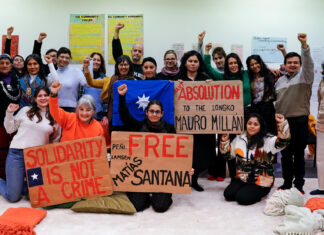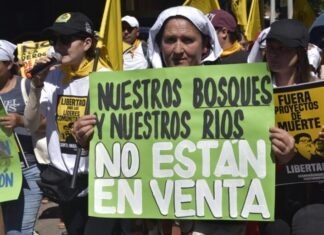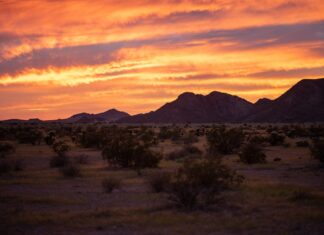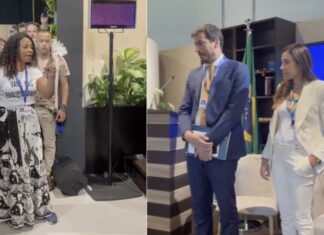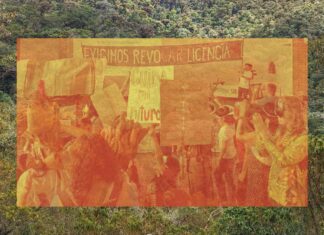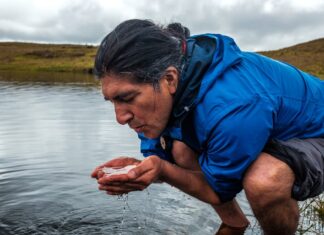The Heart of Our Earth: Community resistance to mining in Latin America tells the story of the unprecedented expansion of the mining industry across Latin America since the 1990s, and the massive social and environmental upheaval this has involved. From the time of Columbus and the Spanish conquistadores, the history of Latin America has been closely entwined with mining. Yet in recent decades, the industry has taken on vast new dimensions, becoming far more powerful and destructive than anything seen in earlier periods.
Driven by high mineral prices, mining companies have moved into countries where hitherto they had little or no presence, and ventured into ever more remote and ecologically sensitive areas, such as high up in the Andean cordillera and deep into the Amazon rainforest. This has brought about unprecedented social and environmental changes: entire landscapes have been radically transformed, and lifestyles which have changed little in centuries have, in some cases, disappeared altogether.
But as mining has expanded, so has social conflict, with frontline communities mobilizing in defence of their lands, water, livelihoods, and cultures. This resistance has occurred throughout the region and has taken on very different forms: from roadblocks to research; from sabotage to street theatre. While some communities have paid a heavy price for their opposition, others have achieved some impressive victories. The Heart of Our Earth tells their story: how the mining industry has affected them, how they have fought back, and their visions for fairer and more sustainable futures.
The book is the product of years of monitoring and research, featuring in-depth interviews not only with activists and leaders from communities affected by the industry, but also with NGO representatives, international experts, academics and others. Written in clear, non-technical language, The Heart of Our Earth is for students, academics, activists, journalists, and anyone who has ever wondered about the true costs of the metals which increasingly power our lives.
Topics:
The Heart of Our Earth depicts the birth of present-day resistance in Chubut, Argentina (Chapter 1) and includes a mixture of well-known cases – such as Cerrejón and Yanacocha (Chapter 4) and the tailings dams disasters in Brazil (Chapter 5) – as well as others which have received little or no attention in the Anglophone press. It looks at Corporate Social Responsibility tactics, greenwashing, human rights, climate change and to what extent mining may be part of the solution (looking at two metals which will be essential for the energy transition: copper, focusing on the Cordillera del Cóndor, Ecuador; and lithium, focusing on the Salar de Atacama in Chile), and what exactly ‘sustainable mining’ might mean in practice.
About the authors
Tom Gatehouse
Tom Gatehouse is a writer, researcher, editor, and translator, who has lived and worked in Argentina, Brazil, and Spain. He worked as editor and project manager on LAB’s Voices of Latin America (2019) and translated Bernardo Kucinski’s novel The Past is an Imperfect Tense (2020). His writings and translations have been published on Latin America Geographies, Mongabay, Red Pepper, and Folha de S. Paulo, on the LAB website, and by literary publishers in Portugal and the UK. He lives in Bristol.
Jo Griffin
Jo Griffin is a freelance journalist and writer who lived and worked in Mexico and Brazil for several years and has continued to report from Latin America. Jo spent ten years on staff with The Guardian and her articles have also been published by The Observer, The LA Times, Al Jazeera, the BBC, and The Times of India, among many others. She has worked as an editor and sub-editor and as a reporter for several short films, including One Man, One City, Three Evictions, for the Thomson Reuters Foundation, about the history of evictions in Rio de Janeiro. She is currently working on a book about a radical prison system in Brazil. She lives in London with her family.
Chapters
*Click through to learn more, find extra information, and access online references:*
The Heart of Our Earth: Community resistance to mining in Latin America
Chapter 1. Introduction: No means no
Chapter 2. From old to new mining
Chapter 3. CSR: We’re in charge now
Chapter 4. Resources before rights
Chapter 5. The mud is still flowing
Chapter 6. Water: The industry’s Achilles heel
Praise for 'The Heart of Our Earth'
Drawing on prodigious, first-hand research, this fiercely argued account unpicks the myth of ‘sustainable mining’ and brings fresh light – and hope – to the cause of anti-mining campaigners. Tom Gatehouse does not seek to paint a romantic picture of a post-extractivist world, free of mined metals and minerals. Instead, he brings a much-needed and too often overlooked perspective to the narrative of commodity-led growth that puts people – not profits – squarely at its centre. An urgent, necessary, and timely book. – Dr. Oliver Balch, freelance author and PhD in Latin American Studies from the University of Cambridge
Unrelenting global demand for minerals is reaffirming Latin America’s historically defined position in the world economy as provider of natural resources. With case histories from across the region, ‘The Heart of Our Earth’ provides an up-to-date and lucid assessment of the skewed form of development that this generates. The book is a parable for our times. – Dr. John Crabtree, research associate at the Centre for Latin American Studies at Oxford University
‘The Heart of Our Earth’ tells an insightful story of resistance to mining across Latin America, skilfully weaving together interviews, case studies, and extensive research, to provide a detailed and accessible discussion of the myriad ways in which the industry is impacting communities, livelihoods, and the environment across the region. – Katy Jenkins, Northumbria University
In ‘The Heart of Our Earth’ , Gatehouse does what he does best: highlight the voices and power of movements making change. Focused on the impacts of the Latin American “mining boom” over the past few decades, the book artfully weaves testimony with action to highlight, not only how frontline communities are struggling against predatory mining, but how these communities are winning. – Dr. Kirsten Francescone, Assistant Professor in International Development Studies at Trent University and former Latin America Program Coordinator at MiningWatch Canada
Based on numerous interviews and cases, Tom presents a portrait of social contestation against mining, respecting the region’s social, political and cultural differences. If, as the Canadian educator Judith Marshall says, “a mine, is a mine is a mine,” resistance is inventive, multifaceted and varied. Tom’s book is a crucial contribution to better understanding this diversity. – Bruno Milanez, Associate Professor at the Federal University of Juiz de Fora in Brazil, and Coordinator of the Politics, Economy, Mining, Environment and Society (PoEMAS) Research Group
In times of increasing violence against environmental defenders and a business-as-usual logic in mining investments, Tom Gatehouse provides a timely and inspiring assemblage of accounts of resistance, legal victories, and struggles for environmental justice and democracy across the region.” – Sebastián Rubiano-Galvis, Postdoctoral Fellow, International Studies Department University of San Francisco, USA









